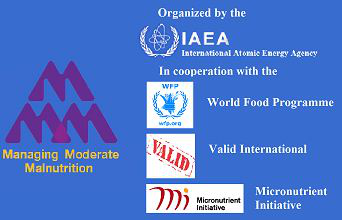NEW ! Provisional programme available ! Please click for download
NEW! Please note that the window for abstract submission has been closed!
Undernutrition, already one of the world’s most serious health problems, is at risk of worsening as the global economy deteriorates. In poor countries, undernutrition is the largest single contributor of more than one third of all deaths of children under five years of age, many of which are preventable through effective nutrition interventions (Lancet, 2008). Thus, reducing undernutrition is vital for children's survival, particularly in poor countries, and consequently for socio-economic development. Moderate malnutrition is associated with more nutrition-related deaths than severe malnutrition because moderate malnutrition affects a greater number of children.
According to the World Health Organization (WHO), moderate malnutrition includes all children with moderate wasting, defined as a weight-for-height between -3 and -2 z-scores with reference to the WHO Child Growth Standards, and those will moderate stunting, defined as a height-for-age between -3 and -2 z-scores with reference to the WHO Child Growth Standards. Most of these children will be moderately underweight (weight-for-age between -3 and -2 z-scores). This symposium will focus on the management (prevention and treatment) of moderate wasting or moderate acute malnutrition (MAM).
The importance of MAM should not be neglected. Altough moderate wasting is not a condition of medical urgency, it can easily deteriorate. If some of these undernourished children with moderate wasting do not receive adequate support, they may progress towards severe acute malnutrition (SAM) — defined by the presence of severe wasting and/or bilateral pitting oedama — which is a life threatening condition. The provision of complemenatary food to prevent and treat moderate malnutrition among children under two years of age is also less costly (US $40-80 per child) than the treatment of SAM (US $200 per episode and per child). Therefore, the management of MAM should be a publich health priority. Preventing MAM could go hand-in-hand with preventing stunting, especially when the focus is on ensuring consumption of nutrition comnplementary food in addition to breastfeeding between the ages of 6 and 23 months.
More evidence on effective programmatic approaches to manage moderate wasting is needed. In the evaluation of interventions, functional and structural outcomes such as body composition should be included in addition to the traditional methods used to assess healthy physical, cognitive and psychomotor development. Accurate assessment of body composition to determine the nature of the weight gained (lean body mass and fat body mass) over time can provide key information for evaluating the efficacy and effectiveness of interventions, as well as for gauging the risk of chronic diseases. The International Atomic Energy Agency (IAEA) has been a leader in developing and promoting the use of standardized protocols for body composition assessment using stable isotope techniques. Such techniques provide sensitive means of assessing the impact of interventions on the quality of growth, i.e., lean vs. fat body mass accumulation. This key information can complement and contribute to global efforts in improving infant and child nutrition.
Programme Structure
The opening plenary session will include welcoming addresses by representatives of the IAEA, cooperating organizations and other relevant organizations. The main sessions will continue with a combination of keynote presentations, invited presentations, submitted papers and panel discussions addressing the main themes and topics of the conference. The final plenary session on the last day of the conference will be dedicated to review and discussion of conclusions and recommendations of the symposium. There will also be poster sessions, and sufficient time will be dedicated to discussion and interaction with colleagues.

